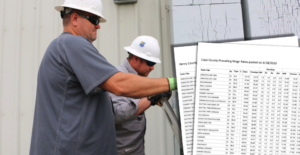
Prevailing wage laws are prevalent across the country. These laws are meant to ensure that employees and laborers on public works projects are paid a fair and reasonable wage for their work. Since these rights are statutory, they are typically construed rather strictly. Under the Illinois Prevailing Wage Act, on such projects, each contract is required to contain a provision guaranteeing that the person will be paid the prevailing rate. But what if the provision isn’t included? Will the laborer still be entitled to file an action for being underpaid? The Appellate Court of Illinois seems to think so.
Illinois prevailing wages
The Illinois Prevailing Wage Act operates like most other state prevailing wage laws. These laws protect those working on public projects by ensuring they are paid a similar rate to others performing similar work in the same geographical area. Failure to receive the proper wages will give rise to an action for recovery. In the state of Illinois, this right is granted under 820 ILCS 130/11:
Any laborer, worker, or mechanic employed by the contractor or by any sub-contractor under him who is paid for his services in a sum less than the stipulated rates for work done under such contract shall have a right of action for whatever difference there may be between the amount so paid, and the rates provided by the contract together with costs and such reasonable attorney’s fees as shall be allowed by the court.
A recent case out of the Appellate Court of Illinois held that a government entity’s failure to insert the prevailing wage provision in its contract doesn’t affect a worker’s ability to bring a cause of action under the Act. This case also highlights that certain types of landscape work are covered under the Act.
Workers on public works project not paid prevailing wage rates
The case in question is Valerio v. Moore Landscapes, LLC
Project Snapshot
- Owner: Chicago Park District (CPD)
- Prime Contractor: Moore Landscapes, LLC (Moore)
- Laborers: Samuel Valerio & 11 others (Laborers)
Moore was awarded several contracts by the CPD for landscaping and other related work. Each of the contracts contained a standard prevailing wage provision, stating:
Contractor shall pay all persons employed by Contractor, or its subcontractors, prevailing wages where applicable. As a condition of making payment to the Contractor, the Park District may request the Contractor to submit an affidavit to the effect that not less than the prevailing hourly wage rate is being paid to laborers employed on contracts in accordance with Illinois law.
To complete the work, Moore subcontracted with 12 landscape laborers (Laborers) as tree planters. These subcontracts did not contain any prevailing wage provision and were paid an hourly rate of $18. However, the prevailing wage rate for the work they were performing was $41.20 per hour. The Laborers filed suit.
Trial court dismisses case because there was no prevailing wage provision
The lawsuit was filed against Moore for unpaid wages, punitive damages, prejudgment interest, and reasonable attorney’s fees. At trial, Moore filed a motion to dismiss arguing that the work was exempt from prevailing wage protection. Specifically, because the subcontracts did not contain a prevailing wage provision.
Since it was not included in the contract, there was no “stipulated rate” of payment according to the terms of the Act. Moore also argued that the landscape work performed wasn’t a protected type of work under the Act. Which is why, they contended, that the provision wasn’t included. Therefore, the Laborers had no right of action. The trial court agreed, and the case was dismissed. The Laborers appealed.
Appeals court declares prevailing wages apply
On appeal, the Court declared that an employer’s failure to include the required prevailing wage provision doesn’t affect an employee’s rights for work performed under the Act. If the trial court decision was allowed, then it would open the opportunity to limit the rights specifically granted under the prevailing wage laws.
Furthermore, the court also refused to dismiss Laborer’s claims because the work isn’t covered under the Act. They conceded that certain landscape maintenance work isn’t covered; such as cutting grass and trimming trees. However, planting trees in previously unplanted areas, and placing pavers for patios and outcroppings may be a different story. This type of permanent work may potentially be “protected prevailing wage work.”
The court reversed the trial court decision to dismiss the claims, and the case was remanded for further proceedings to determine whether the work performed was covered under the IL Prevailing Wage Act or not.
Illinois prevailing wages supersede construction contract
Prevailing wage laws are meant to protect workers from being underpaid for work performed on public projects. When an employee is hired on a public works project protected under the IL Prevailing Wage Act, their contract should include a provision guaranteeing that they will be paid the prevailing wages. However, even if this provision is absent from the contract, they will still be entitled to the rights provided by the Act. Allowing this exception would defeat the legislative intent and purpose of the Act, which is the public policy to favor and protect laborers on public construction projects. So next time you’re working on a protected project, if you are getting underpaid, you will have the right to be compensated. Even if your contract doesn’t say so.